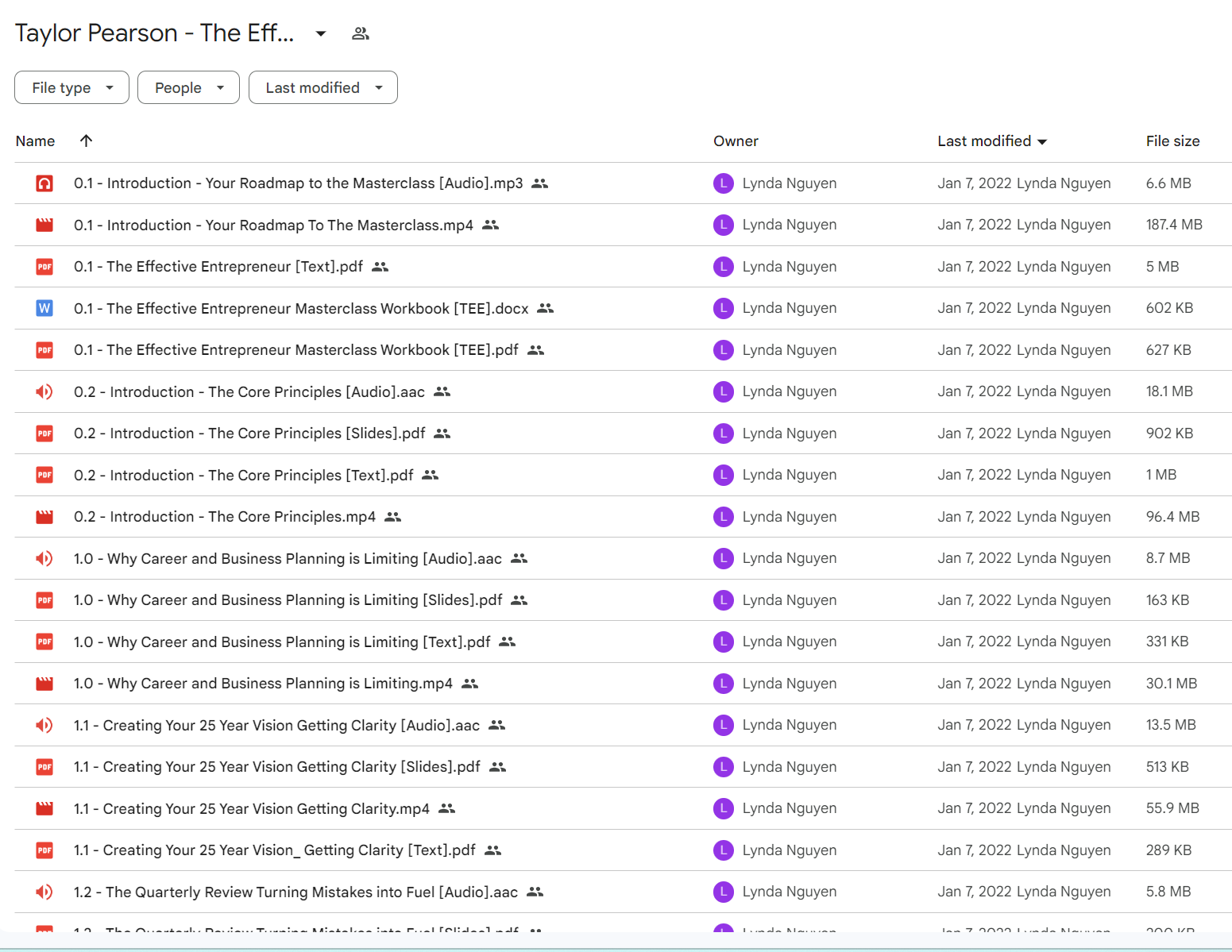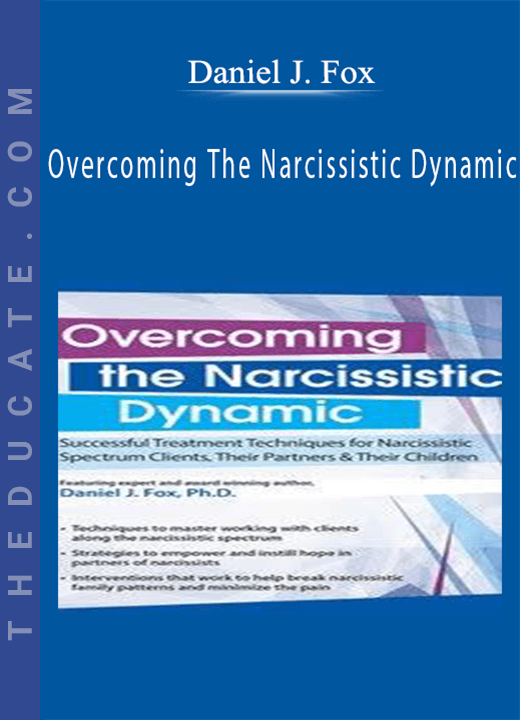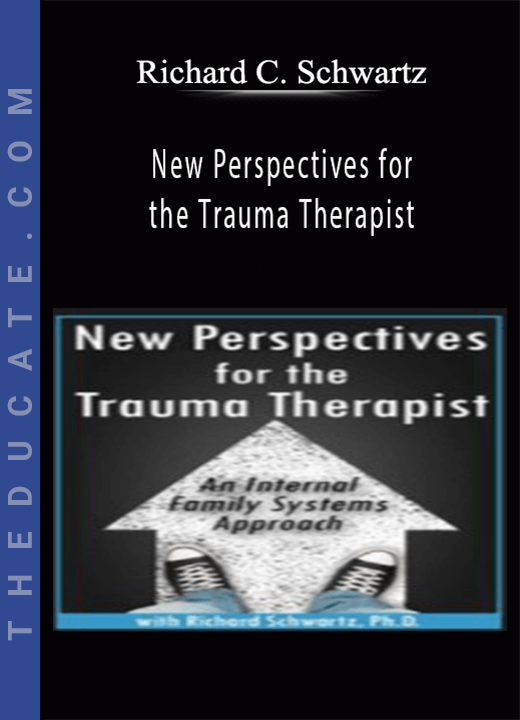Description

Taylor Pearson – The Effective Entrepreneur
CHOOSE, PLAN & ACCOMPLISH YOUR MOST IMPORTANT GOAL
IN 90 DAYS
EVEN IF YOU’VE STRUGGLED WITH MOTIVATION, OVERWHELM, AND FOCUS IN THE PAST
WHAT IF YOU COULD CONSISTENTLY ACCOMPLISH YOUR MOST IMPORTANT GOALS?
What if you had complete clarity of what you were working on, the confidence to do it to the best of your ability, and the motivation to power through the challenges?
Do you wake up every morning to a sense of panic and uncertainty? Do you go through your days, weeks, and months jumping from one thing to then next?
You’ve resigned to being tired, overworked, and under-apprecciated because you’ve been told “it is what it is.”
What if life were different?
IMAGINE WHAT YOUR LIFE WOULD LOOK LIKE IF YOU WERE ABLE TO CONSISTENTLY PRIORITIZE AND FOCUS:
You would wake up every morning and take an hour to ease into the day, maybe having a coffee and reading or visiting with your family. You’d know exactly what needed to get done that day and you’d have planned to have plenty of time to do it.
You’d sit down at your computer and start working. By lunch you’d already have finished the your most important task, the one thing that will do more to move your business forward than anything else.
In the afternoon you’d have plenty of time to workout, go for a walk, or just spend time friends.
At the end of each day, you’d feel closer to your goal than when you started. You’d feel a sense of progress and momentum.
You could relax over the weekend, because you’d know you accomplished the most important things.
At the end of a month, quarter, or year, you could look back and see continuous, upward progress.
BUT HOW OFTEN DO YOU ACTUALLY FEEL LIKE THAT?
Do you end the day with that feeling of accomplishment and progress, or do you feel like you were just putting out fires?
At the end of the quarter or year, can you look back and see measurable progress, or do you worry you spent most of the time spinning your wheels?
Do you have confidence about your direction, or are you constantly worried you’re missing out or working on the wrong thing?
How much time do you spend wondering “How do I know if I am choosing the right goal to work on?”
When you look up at the end of the month, or year, how much of what you were spending your time and energy on was actually getting you closer to a meaningful goal?
THE SECRETS THE MOST SUCCESSFUL PEOPLE HAVE IN COMMON
When Mark Parker was appointed CEO of Nike, he got a phone call from Steve Jobs. The pair had worked on a previous collaboration and Jobs had called to congratulate Mark on his appointment. Mark replied by asking Jobs if he had any advice.

Jobs quickly replied “no,” then paused. He took a deep breath and said “Nike makes some of the best products in the world. Products that you lust after. But you also make a lot of crap.”
“Just get rid of the crappy stuff and focus on the good stuff.”
There was another pause. Parker expected a laugh.
It never came.
In a later interview in which Jobs was asked what accomplishment he was most proud of, he responded that he was as proud of what Apple didn’t do than what it did.
When a reporter asked Warren Buffett, “If you were to boil down your key to success to one principle what would it be?”
“For every 100 opportunities that are brought to me,” replied Buffet, “I say no 99 times.”
That’s not just “no” to investment or acquisition opportunities, he explained. It’s “no” to any solicitation of his time or attention.
Jobs’ and Buffett’s secret wasn’t a complex, opaque organization system, or a fancy management technique.
It was finding the few, essential things to focus on ruthlessly, and eliminating everything else.
They identified goals important enough to commit to, and had the confidence to stop doing the 99% of things that weren’t taking them closer to those goals.

What do all these high performers have in common? An extraordinary ability to focus and prioritize.
And it’s not just Jobs and Buffett.
Authors have been writing about the power of focus for the last century. And yet, still the struggle continues.
Why? What are you doing wrong?
The answer is nothing.
No one can expect you to change your life and achieve your most important goals without having a proper system.
But you already knew that.
It’s not by accident that you found your way to this page. You’re a high-performer, the type of person who thinks differently and works on improving themselves, not because someone is telling them to, but because you believe it’s important.
However, you need the right system.
I doubt that’s news to you: you know that you need to study, model and use the components of other’s successes.
You’ve just never been given a system that does this.
The most successful individuals all share commonalities. They follow certain, common principles. These principles are how they are able to remain so focused and become so successful.
Combined, their principles are the key to accomplishing big, hairy, audacious goals.
Many of them don’t consciously realize it, but there are key principles that have allowed them to accomplish goals with what appear like effortless ease while you’re struggling and slogging through your day – drained of your energy, time, and willpower.
Revealed further down this page, and expanded on in the masterclass, these core principles are the answer to why two people can both be hardworking and smart, but one can go much further and faster than the other, without sacrificing their health, relationships, or having a prestigious pedigree.
Once you understand these principles, and you adopt a system which lets you internalize them and use them in your everyday life, you’ll have a roadmap to finally start achieving more, working less, and having time for yourself.
HOW MUCH IS YOUR LACK OF FOCUS HOLDING YOU BACK?
A lack of focus is dangerous, precisely because it’s so hard to quantify. The costs are hidden, we never really see them. It’s like a little hole in the bottom of your productivity basket that slowly but surely saps your best time, attention and energy.
Ask yourself:
How much is it costing you every time you abandon one project to work on another one that “might be a better opportunity?”
How many of those projects have seen the light of day?
One past participant of the masterclass explained his situation this way: “I remember staying up at night which is when I work on projects a lot and what would happen a lot of times is that I’ll hit a roadblock for one and switch to another and end up working on four different projects in the space of an hour without really getting anything done.”
Can you relate?
How much more could you achieve if you had the clarity to choose just one essential goal and focus on it relentlessly?
How much more focus would you have if, like Warren Buffett, you had the confidence to say “no” to everything that wasn’t moving you closer to your objective?
How much momentum do you lose when you sit down to work on a project and you’re afraid to do the scariest, most important thing? How much time have you squandered doing more “research” or more “product development”, or just getting to inbox zero?
The good news is there is a way to accomplish your goals without putting in more hours. You can experience breakthroughs in your career and still have time for yourself, your family and your friends.
MOST PRODUCTIVITY SYSTEMS FAIL FOR THREE REASONS:
1. THEY DON’T GIVE YOU A SENSE OF CLARITY AND CONFIDENCE
The struggle many people have, that I had, was that all my systems for school or non-entrepreneurial jobs were built around receiving tasks from someone else and getting them done.
When it’s up to me, how do I figure out what to do?
I’ve seen how the lack of clarity has eaten away days, weeks, months of my life and the lives of those I’ve worked with. You don’t trust yourself that the goals you’re working towards are the “right” ones so you set many goals and end up making progress on none of them.
Lacking clarity on a single objective, you don’t have the confidence to keep others from pulling you off your bearings. You see a new project, a new tactic that might be faster or easier and so you jump to it, leaving a wake of half-finished projects behind you.
We all know that if we try and work on too many different projects/concepts, none of them will excel. However, when you’re interested in pursuing many different paths, how do you choose? When do you branch out, if ever?
2. THEY LEAD TO A FEELING OF OVERWORK AND OVERWHELM.
The problem with to-do lists and task management solutions is that lists go on forever, but your time and energy doesn’t. This results with cramming your day with too many tasks and ending the day tired and scattered.
Even if you’ve done goal setting exercises to get clear, you don’t have a way to “operationalize” focus. Focus is hard because it isn’t making a single decision, it’s making hundreds of decisions. You have to say no to competing priorities every hour of every day.
A single “yes” must be protected with a thousand “no’s”
So you do things that make you feel like you’re being productive. But when you look back at your last month or year, you don’t see the the progress toward your goals that you know you’re capable of.
3. YOU KNOW WHAT TO DO, BUT YOU’RE JUST SCARED?
Most productivity books and systems don’t even mention the concept of emotional work, what Steve Pressfield has called “The Resistance.”
The Resistance is the emotionally difficult work: it’s sending the cold email to someone you respect or publishing your thoughts for thousands of people to see. These are not hard logistically, they are hard emotionally.
Ben Horowitz, one of the most successful entrepreneurs and venture capitalists, had this to say:
“By far the most difficult skill I learned as CEO was the ability to manage my own psychology. Organizational design, process design, metrics, hiring, and firing were all relatively straightforward skills to master compared with keeping my mind in check. I thought I was tough going into it, but I wasn’t tough. I was soft.
Over the years, I’ve spoken to hundreds of CEOs, all with the same experience. Nonetheless, very few people talk about it and I have never read anything on the topic. It’s like the fight club of management: The first rule of the CEO psychological meltdown is don’t talk about the psychological meltdown.”
Not all work is created equal and often the difficult emotional work of fighting The Resistance and managing your own psychology
If you’re not achieving your goals, if you feel like you aren’t operating at the level you’re capable of, it’s simply because no one has given you the appropriate system.
But as you’ve read above, it is possible.
You can finally live a life of effortless productivity when you put in place these 5 Pillars:
PRINCIPLE #1: THE FEAR IS THE COMPASS TO EFFECTIVENESS
OVERCOMING OVERWHELM, GETTING YOUR PRIORITIES STRAIGHT, AND MAKING CONSISTENT PROGRESS

PRINCIPLE #2: DO MORE OF LESS: WORK IN SEQUENCE, NOT IN PARALLEL
REDUCE STRESS, INCREASE YOUR CHANCES OF SUCCESS AND FEEL A SENSE OF ACCOMPLISHMENT.

PRINCIPLE #3: TREAT IT LIKE AN EXPERIMENT
WHAT THOMAS EDISON AND BUCKMINSTER FULLER CAN TEACH US ABOUT DOING OUR BEST WORK

PRINCIPLE #4: VERTICAL COHERENCE
REGAIN YOUR CLARITY. FUEL YOUR MOTIVATION.
PRINCIPLE #5: SYSTEMS ALWAYS WIN
ROCK-SOLID CONFIDENCE AND CONVICTION.

HOW EXACTLY DOES THE EFFECTIVE ENTREPRENEUR WORK?
I organized The Effective Entrepreneur into 4 stages:
1. 25 Year Vision
2. The Quarterly Plan
3. The Weekly Review
4. The Daily Ritual

INTRODUCTION AND PRINCIPLES
In this bonus ‘Getting Started’ module, you’ll start to set yourself up for success with the system. Before I send you into the Core Modules, I want to help shape your psychology to get the most out of the masterclass.
In this module, I’ll show you:
- A summary of 40 years of research on productivity and what we can (and can’t) conclude from it
- Why launching your project can be scarier than going on patrol in enemy territory and how you can act in spite of the fear
- The neurobiology showing how social media acts on your brain (Hint: a lot like cookies) and how to build a system which lets you do your most important work (instead of eating the cookies)
- The surprising cost of context switching and how you can eliminate it while still working on everything that interests you
- What a 1990’s study of two unlikely professions teaches us about staying motivated
MODULE #1 PART I: 25 YEAR GOAL SETTING
MODULE #1 PART II: THE QUARTERLY PLAN
MODULE #2: THE WEEKLY REVIEW
MODULE #3: THE DAILY RITUAL
CONCLUSION AND IMPLEMENTATION
Instead of just leaving you with broad concepts, I’ll be immersing you in a day-in-the-life.
In this module, I’ll show you:
- How the “80% Rule” can help you get the most of the system without feeling constrained or deprived
- The wisdom of “muddling fuckery“
- The tradeoff between stress and meaning and how to balance between them
- A tour of my complete implementation of the system showing you exactly how I put it into practice on a day-to-day basis
You’ll see exactly what the quarterly, weekly, and daily review and planning look like when I do them. You’ll finish with the system already implemented in your life.







4 reviews for Taylor Pearson – The Effective Entrepreneur
There are no reviews yet.